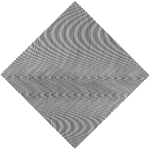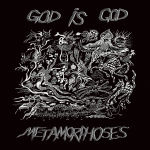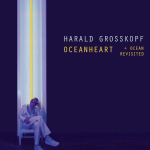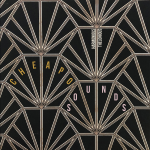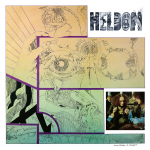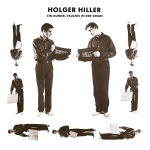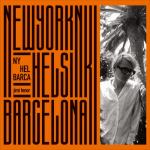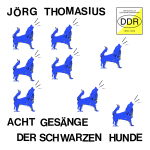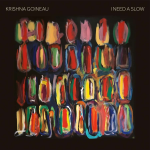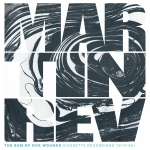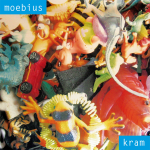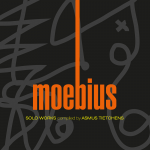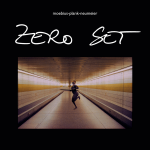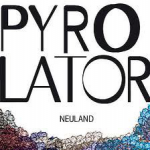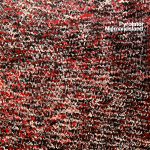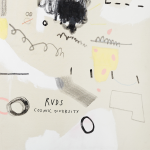Labels
Bureau B
- 01. Several Hands On Our Piano
02. Don’t
03. Flashback Caruso
04. Voices And Trumpet And All
05. J’ai Mal Aux Dents
06. Beim nächsten Ton ist es...
07. Two Drums, Bass, Organ
08. Dr. Schwitters Intro
09. Several Hands On Our Piano (Continued)
10. Beam Me Up, Scotty
11. Elerimomuvid
12. Dr. Schwitters (Continued)
13. Have A Good Time, Everybody
14. Above And Under Our Piano
15. Hermanns Lament
16. Donnerwetter
17. Was ist hier los?
18. Rudolf der Pianist
19. Ricochets
20. I’ve Heard That One Before
21. Watch Your Step
22. Under Our Piano Again
23. Fluid Chorus
24. Stretch Out Time
25. Der Baum
26. Chère ChambreFAUST
The Faust Tapes
[engl] There’s something perversely fabulous about the thought of this warped masterwork wandering into 60,000 unsuspecting British homes in 1973. Faust’s second-and-a-half album hit the shops to celebrate their signing to the nascent Virgin Records, who were looking to take advantage of the zeitgeist for German music at that time. Undeterred by the fact the band’s unwillingness to engage with the commercial landscape had seen them dropped from Polydor, Branson and co cooked up a suitably spectacular marketing strategy, selling the LP for 49p, the bargain price of a single. Shoppers flocked in their thousands to grab a copy, raced home and then spent the next forty five minutes checking their tracking, banging the speakers and blowing the needle, all to no avail. Do not adjust your set - This is Faust. What was lurking within the grooves was a condensed collage of outtakes, oddities, sketches and samples previously known to the band’s nearest and dearest as ‘The Faust Party Tapes’ - and how you wish you’d been to those parties. Cacophonous keys and roaring drones splinter into a deranged hybrid of tumbling toms and yelping vocals; committed experimentalism which in no way prepares you for the beautiful ballad which follows. Armed with acoustic guitar, playful piano and panning vocals, Faust fashion a pastoral idyll imbued with the most profound yearning. “Flashback Caruso” brims with Byrds-ian jangle and Syd’s psychedelia, its non-sensical English lending the piece a Confucian lyricism perfect for expanded minds. And just as the soaring, searing solo suggests we’re on route to eternity, the group snap, crackle and pop into another rabid découpage. Sliced and spliced between TV snippets, dissonant trumpet and the sound of someone pissing, the utterly freaky fuzz-rock of “J’ai Mal Aux Dents” sounds positively radio-friendly, far less far out than if it were encountered alone. Compared to the non-musical madness beside it, this thrash-jazz trance dance makes perfect sense, as does the corrosive breakbeat of “Two Drums, Bass, Organ”, a mutant funk workout which rivals Can in an all-German dance off. The progressive and symphonic “Dr. Schwitters”, dissected by fragments of dissonant process music, haunted vocal takes and the proto-industrial grind of “Elerimomuvid”, charts a course for the dark side of the moon more suited to the serious cosmonauts of the world. Then the record freefalls into disorienting drum workouts, mixing desk experiments and a wicked premonition of no-wave jazz (“Hermann’s Lament”) before taking slight respite in the beauty of “Rudolf Der Pianist” and “I’ve Heard That One Before”. The particles of prepared piano, power tools and tape echo continue to cascade through the soundspace, gradually building into the final trilogy of “Stretch Out Time”, “Der Baum” and “Chère Chambre”, which return to conventional song structure, albeit in the group’s typically twisted style. Once again though, in comparison to the wonderfully weird pieces which precede them, these three tracks are entirely accessible, and in this lies the brilliance of the LP. It doesn’t just succeed as a conceptual prank, or musical prediction, but by an expert balancing act between the profane and profound, presents its most accomplished moments in their most intelligible form. For the open minds and eager ears, Faust’s cryptic charm had been laid bare, and the heads had a new favourite band.- Format
- LP
- Release-Datum
- 18.08.2022
- EAN
- EAN 4015698627695
- 01. Behind The Heroes
02. The Song Pt. 1
03. Liquid Space
04. The Song Pt. 2
05. Masha-Marie
06. Metamorphoses Pt. 1
07. Metamorphoses Pt. 2
08. Drops
09. Dream
10. Song To The SirenGOD IS GOD
Metamorphoses
[engl] Metamorphoses is the debut album by electronic duo God is God for Hamburg-based imprint Bu- reau B. The duo consists of Turkish musician, producer and Kinship label founder Etkin Çekin and Belarussian multi-instrumentalist, composer singer and Not Not Fun alumni Galina Ozeran who star- ted making music after a chance meeting in Berlin in 2015. Metamorphoses is the product of their second ever improvisational encounter: an undulating, avant-pop journey of low-BPM twists and turns guided by Ozeran’s synthesizers, Russian and English vocals and Çekin’s ethereal production and guitar sensibility. Central to the album’s musical narrative are both contemporary dancefloor- adjacent electronics and Eastern European and Turkish psychedelic electronic traditions – all filte- red through the prism of Çekin and Ozeran’s respective musical histories.- Format
- LP
- Release-Datum
- 18.02.2022
- EAN
- EAN 4015698111446
- LP1
01. Eve On The Hill
02. While I‘m Walking
03. Oceanheart
04. Coming Out
05. Pondicherry Dream
06. Minimal Boogie
LP2
01. Eve On The Hill (Ocean Revisited)
02. While I‘m Walking (Ocean Revisited)
03. Oceanheart (Ocean Revisited)
04. Coming Out (Ocean Revisited)
05. Pondicherry Dream (Ocean Revisited)
06. Minimal Boogie (Ocean Revisited)HARALD GROSSKOPF
Oceanheart (ltd. deluxe edition)
[engl] In 1984, four years after the release of my first solo album SYNTHESIST on SKY Records, I wanted to produce a new solo album. At the time I was operating on the fifth floor of a former backyard factory on Graefe-Str. in Berlin Kreuzberg with my Neue Deutsche Welle Band LILLI BERLIN. We'd turned the space into a small music and rehearsal studio where we set up a TASCAM 8-track tape recorder, a 12- channel MM mixer that roared like hell, a Mini-Moog and a ROLAND Jupiter-6 synthesizer. This is where the basic recordings for OCEANHEART were made. Essentially sequences and chords, which I then added piano, drums, Indian tablas and solo voices to in Christoph Franke's (Tangerine Dream) studio in Berlin Spandau. It was then mastered on a BETAMAX video recorder - at that time the non-plus-ultra of modern stereo recording technique. Oceanheart was released on SKY Records in 1985. At the beginning of 2022 Gunther Buskies, owner of BUREAU B label, had the inspired idea to expand the planned re-release of OCEANHEART with a remix album on double vinyl and CD and to call it OCEANHEART REVISITED. Around the same time I met Tobias Stock through my friend Chris Mick. Tobias, a qualified electronics engineer and musician, had put together a complex, top-class analog studio over 20 years of meticulous and passionate collecting - bringing each of the numerous component parts back into the best technical state with his own hands. There are only few studios of this kind and quality in the world and it was here, in his 'On TAPE’ Studio, we created the analogue mixes of OCEANHEART REVISITED on a NAGRA 2-channel tape machine. I really enjoyed working on OCEANHEART REVISITED and I'd like to share this experiment with you. Harald Grosskopf, January 2023- Format
- DoLP
- Release-Datum
- 07.04.2023
- 01. Soft Opening Machine
02. Liquid Sound Waves
03. Limitations
04. M And A
05. Gummi Twist & Crawl (Die Koffer sind leer)
06. Sunglasses
07. Orion Stars
08. Back From The Primitive Galaxy
09. Cheapo Sounds
10. AfterhourHARMONIOS THELONIOS
Cheapo Sounds
[engl] A pivotal figure in Düsseldorf’s Salon Des Amateurs, Stefan Schwander has already amassed a remarkably rich musical reper- toire. Through his Harmonious Thelonious project, he has spent the past dozen years exploring the worlds of Pan-African, South Ameri- can and Middle Eastern rhythms in combination with a minimalistic electronic sound, distilling his very own groove from the point at which they converge. His new album - challengingly entitled “Cheapo Sounds” - sees Schwander move away from tried and trusted recipes.- Format
- LP
- Release-Datum
- 20.01.2023
- EAN
- EAN 4015698862775
- 01. Zind
02. Back To Heldon
03. Northernland Lady
04. Ouais, Marchais, Mieux Qu'en 68 (Ex : Le Voyageur)
05. Circulus Vitiosus
06. Ballade Pour Puig Antich, Révolutionnaire Assassiné En EspagneHELDON
Electronique Guerilla (Heldon I) (50th Anniversary Edition)
[engl] In 1973, 22-year old Richard Pinhas was well on his way to becoming a full-time philosopher. He had almost finished his Ph.D and begun teaching at the University of Paris. But he also had a hobby: writing music and recording it himself. When he submitted a few tracks to British label E.G. (home of King Crimson and Roxy Music), the imprint was interested, but Pinhas was frustrated to find out he’d have to wait a year for them to release anything. So Pinhas put out his first album on his own label, Disjuncta. He called the project Heldon (from a location in Norman Spinrad’s 1972 sci-fi novel “The Iron Dream”). It might have been the first self-released rock record in France. “Or at least the first one that worked,” says Pinhas. “It was like a musical and political event in France. Musical because there were few artists using synthesizers here, or even in the world. And political because we tried to say that the big companies make everything bad and their records are too expensive.” Most of “Electronique Guerilla” was made by Pinhas alone, but “Ouais, Marchais, Mieux Qu’en 68” featured five collaborators, including one of his mentors, Gilles Deleuze. Over winding guitars and pointed percussion, the French philosopher reads lyrics taken from Friedrich Nietzsche’s “The Voyager and His Shadow”. Despite being self-released – with Pinhas himself delivering some stock directly to record stores — “Electronique Guerilla” quickly sold over 19,000 copies. That convinced Pinhas he should make and release more music by himself — but he would have little time for philosophy. “I had to make a decision, because at that point in France, you couldn’t do two jobs,” he remembers. “So I made this very bad choice to be a rock ’n’ roll musician.” It’s a choice he’s stuck to for four decades, and the fiery “Electronique Guerilla” provided a potent spark.- Format
- LP
- Release-Datum
- 01.03.2024
- EAN
- EAN 4015698855036
- 01. Liebe Beamtinnen und Beamte
02. Blass schlafen Rabe...
03. Budapest - Bukarest
04. Jonny (du Lump)
05. Akt mit Feile (für A. O.)
06. Hosen, die nicht aneinander passen
07. Chemische und physikalische Entdeckungen
08. Mütter der Fröhlichkeit
09. Ein Bündel Fäulnis in der Grube
10. Das Feuer
11. Ein Hoch auf das BügelnHOLGER HILLER
Ein Bündel Fäulnis in der Grube
[engl] With "Ein Bündel Fäulnis in der Grube", Holger Hiller presented his solo debut having left Palais Schaumburg. Originally released in 1983 on the Düsseldorf scene label Ata Tak, an international release followed in 1984 via Cherry Red Records. Combining electronic sequencer sounds and sampling fragments with unconventional lyrics its multidisciplinary approach locates it somewhere between the pop and avant-garde. Bureau B is now making the work accessible again on its 40th anniversary. In 1983, during the completion of this album, some ideas and views of the future changed for me. While everyone's mind was still haunted by the admonishingly gloomy vision of George Orwell's "1984", the release of the motion picture "Blade Runner" had a lasting effect. It depicted a world that can no longer be saved: Acid rain is pouring down derelict buildings and humanity has to confront fugitive cyborgs as a result of artificial intelligence gone wrong. The future however was not quite so clear-cut as those pictures: dystopian imaginings were also being layered with mosaic pieces of a pop history that saw itself as a source of hope, a supposed counterculture. Could this promise be fulfilled or was it simply a "productive misunderstanding"?? ? With the onset of digitalisation the new musical tools - first and foremost the techniques of "sampling" and computerised sequencing - were enthusiastically met by me and many others, a generation of William Burroughs readers whose sensibility had been nurtured by "cut-up" and "automatic writing".? ? And so everything flowed together on this album: the esoteric heritage of various hippie and alternative movements and their expressions in "Pop", the underlying currents of "Modernism" and the influences of European "Neue Musik". The resulting musical pieces on the album celebrate this moment in its simultaneity, its confusion and its new confidence.- Format
- LP
- Release-Datum
- 24.11.2023
- EAN
- EAN 4015698372373
- 01. Exotic House Of The Beloved
02. Sambakontu
03. Dub de Pablo
04. Baby It Hearts
05. Anna Mennä
06. Heinola
07. Jameson
08. Another Space Travel
09. Salo
10. Downtown
11. Bondage
12. Doin‘ Alright
13. Walkie Talkie
14. Espoo
15. O-Sex
16. Plan 9
17. Travellers Cape
18. Super Beat
19. My WomanJIMI TENOR
Deep Sound Learning (1993 - 2000)
[engl] Jimi Tenor can look back on a career spanning almost 30 years, in which time he has released more than 20 albums on such renowned labels as Warp Records, Sähkö and Kitty-Yo. Pop artist prestige holds no sway over the Finnish composer and multi-instrumentalist. Never resting on his laurels, he continues to hone his unique sound, which draws on elements of jazz, Afrobeats and experimental electronic music.- Format
- DoLP
- Release-Datum
- 09.04.2021
- EAN
- EAN 4015698051445
- 01. Xineotepe Heat
02. Utopian Dream
03. Take Me Baby
04. Fantom (The Wandering Ghost)
05. Tesla
06. Year Of The Apocalypse
07. Spell
08. Rubberdressing
09. Teräsmies
10. Sugardaddy
11. A Daughter Of The Snow
12. Shore Hotel
13. Muchmo
14. Backbone Of Night (feat. Riga Symphony Orchestra)
15. My Mind
16. Natural Cosmic Relief
17. Voimamies
18. Unmentionables
19. Theme Sax
20. Outta SpaceJIMI TENOR
NY, Hel, Barca
[engl] "NY, Hel, Barca" is a compilation of Jimi Tenor's early works from the legendary Warp and Sähkö days (1994-2001).- Format
- DoLP
- Release-Datum
- 06.03.2020
- EAN
- EAN 4015698637830
- 01. Besen im Kopf
02. Okoschadel
03. Küss mich mein Liebchen
04. Malcom Makes The World Go Round II
05. Dritter Komparsengesang
06. Paradiesvögel
07. Überdachtes Klavier
08. Erste Himmelsmelodie
09. Nikolaus der Erste
10. MeditationJÖRG THOMASIUS
Acht Gesänge der schwarzen Hunde
[engl] Tension. Performance. Resistance - our Zonic Spezial documenting underground cassette culture in the latter years of the GDR caused quite a stir when it first appeared in 2006. A collaborative effort with the legendary ZickZack label and Verbrecher publishing house, “Spannung. Leistung. Widerstand. Magnetbanduntergrund DDR 1979-1990” (to give the work its full title) caused many lis- teners, especially those in the West, to prick up their ears in astonishment when they played the book’s accompanying CDs. This odd potpourri of swirling post-punk manifestations was compiled with solid interpretive authority by Bert Papenfuß, Bo Kondren, Bernd Jestram, and Ronald Lippok. They did, however, erroneously attribute one piece to Jörg Thomasius and Dieter Zobel’s Ostkraut band Das Freie Orchester instead of the “Musik aus dem Regen” tape on their own Kröten Kassetten imprint. Whilst the Zonic Spezial itself has become an eminently collectible rarity, Bureau B succeeded in making at least parts of the musi- cal spectrum available to a wider international audience with their 2014 release “Magnetband”. Serendipitously coinciding with the publication of a second book, “Magnetizdat DDR” (no listening material this time around), Bureau B now revisit the experimental electronic underground of the German Democratic Republic with two releases: “MEZ 31,00” - a solo cassette by Dieter Zobel aka Didier Leboz from the year 1989 - and this collection of Jörg Thomasius productions spanning the years 1980 to 1990. Jörg Thomasius, otherwise known as Tomato, born in East Berlin in 1955, discovered progressive sounds in the early 1970s. He was increasingly drawn towards the electronic signals emanating from West Berlin, so close and yet so far away, carried on radio waves through the Iron Curtain and surfacing sporadically in eager record collector circles on the eastern side of the wall. A Venn diagram of interests brought Tomato into the same space as Andreas Grosser, renowned today for his legendary microphone repair skills. Grosser’s Dutch father had lost no time establishing contact with the West Berlin scene, sourcing equipment for congenial zeitgeist trips in his Berlin-Biesdorf garden arbour. On seeing this wired up chamber of wonders in late 1977, Thomasius was catapulted into the world of electronics. It was here that he would meet Terry Riley, handing out LSD on his eastern expedition. Grosser became a kind of mentor to Thomasius, who had started to explore the tape format. Even after leaving for West Berlin, Grosser would help him out with contacts and contraptions. Thomasius also struck up a rapport with Conrad Schnitzler and the pair spoke regularly on the telephone until they were finally able to meet in person in 1985. Thomasius had been working on a GDR radio show called Trend since 1981, albeit outside of any legal structures, and in 1982 he began writing “Innovation under adverse conditions” copy for the the English Eurock fanzine Neumusik alongside the GDR mainstream producer Wolfgang Fuchs from Pond. He was also a member of Das Freie Orchester (until 1989), an improvised formation of longish-haired freaks who had an idiosyncratic sense of humour. Kröten Kassetten was founded to cater to DFO and any solo or duo jaunts. Thomasius worked as a boilerman and exhibition technician for the Centre for Art Exhibitions of the GDR, compatible with his bohemian lifestyle and affording him access to a typewriter and telephone line. He set about introducing Kröten sounds to the international market via deals with labels in the UK; Italy, Norway and the USA. Ken Montgomery, who ran the American label Generations Unlimited, organized an illegal Schnitzler performance in East Berlin’s Church of the Redeemer in 1986 which was also made available via Kröten channels, whilst the Thomasius LP “Tomato” was released on Generations Unlimited in 1989. The material collected on “Acht Gesänge der schwarzen Hunde” comes from three places: the “Schwarze Hände” cassette with productions from 1980-1985, released on Werner Piepner’s Transmitter label, the 1989 Kröten cassette “Gesänge der Komparsen” and “After Eight” from the year 1990, issued on the Tomato label after Thomasius had left the DFO. Spanning a full decade, the selection presents Thomasius as the multifaceted artist he is, even if he sees himself as more of an experimental DIY sonic creator: spherical, elegaic sounds float around whimsical jewels of extreme playfulness, weaving obscure vocal fragments into strange min- imal constructs. Ten years of creativity under GDR conditions, more of which is recounted in the book “Magnetizdat DDR” were followed by another ten in reunified Berlin. Thomasius teamed up with Conrad Schnitzler and Lars Stroschen to run the Tonart label, but those stories, along with the subsequent Thomasius hiatus, will have to wait for another day. Now is the time to (re)discover him all over again.- Format
- LP
- Release-Datum
- 15.04.2022
- EAN
- EAN 4015698068634
- 01. Prologue
02. Scary Memories
03. Atonal Floating
04. Full Of Life
05. In The Town Hall
06. At The Funfair
07. A Mysterious Crime
08. At The Funfair 2
09. The Cabinet Of Dr. Caligari
10. Jane's Theme
11. March Grotesque 2
12. Jane’s Theme 2
13. Shadows
14. Tragic Message
15. Suspicion
16. Tragic Message 2
17. The Plan
18. A Dark Figure
19. Caligari's Theme
20. Arrest Of The Suspect
21. Caligari's Theme 2
22. Worried Jane
23. Interrogation
24. Jane's Fear
25. Francis's Observation
26. Cesare's Attack And Escape
27. Safe And Sound
28. Francis At A Loss
29. Caligari's Deception
30. Lunatic Asylum
31. In Search Of The Truth
32. Out In The Field
33. The Director Rants And Rages
34. Scary Memories 2
35. Who’s Mad Here?
36. Francis Rants And Rages
37. EpilogueKARL BARTOS
The Cabinet Of Dr. Caligari
[engl] Narrative film music and sound design for Robert Wiene's classic 1920 psychological thriller. 2012 - 2014 digitally restored in 4K by the Friedrich-Wilhelm-Murnau-Foundation. Musician and writer Karl Bartos has long been admirer of Weimar-era culture. During his time in Kraftwerk, he helped create the stunning track 'Metropolis', directly inspired by a band viewing of the classic 1927 Fritz Lang film of the same name. The original orchestral music composed for The Cabinet of Dr. Caligari by Giuseppe Becce had long been lost and in 2005, after watching the film, Bartos imagined what it would be like to create an entirely new one in the 21st Century in his home studios in Hamburg. Now with crystal clear images, digitally restored by the Friedrich-Wilhelm-Murnau-Foundation, the film is visually the best quality it has ever been, and now, with Bartos' soundtrack, there is impressive sound to go with the haunting vision. For the task, Bartos ransacked his own library of musical compositions, recreating pieces he had written as a young classical musician in his pre-Kraftwerk days whilst creating new sounds, melodies and textures. The intention was not simply to write a film score per se. This was to be an immersive listening experience with special sound effects to match the action as we enter the film as both spectator and participant. A creaking door, footsteps on gravel, the turning of pages in a ledger, a half-heard fragment of dialogue are seamlessly synchronised to the action on screen. By taking the characteristics of Expressionism in the arts, and transferring them into film making, a disturbing, distorted depiction of reality enwrapped and entrapped the viewer. The subjective replaces the objective. We are sucked into a parallel world lit in menacing chiaroscuro, where dimension, proportion and perspective are all off skew. From the convex polygon-shaped windows of precipitously sharp-inclined buildings to the surreally odd tables and chairs with long spindly legs to be found in preposterously small and oddly shaped rooms, alienating camera angles and im possible vanishing points, the town of Holstenwall in which much of the action takes place, is the world of the imagination, not the empirical world of our own eyes and ears. 'The cinema image must become an engraving,' the film's set designer Hermann Warm said. Into this world journeys Caligari himself played with supreme artifice by Werner Krauss. He is the hypnotist, a shamanistic figure who controls Cesare (Conrad Veidt), his exhibit, who resides as if dead in a coffin-like wooden cabinet, a somnambulist who can predict the future, and who only wakes at Caligari's bidding. Caligari, in top hat, hornrimmed glasses and white hair is, by turns oddly ridiculous with his facial mannerisms and gurning and dangerously demonic in his magical control. Cesare by contrast is strangely beautiful if tortured, his dark tousled short hair matted in sweat, his clownlike face a rictus of fear and possession. With dark kohl round the eyes and lipstick on the lips, he looks more modern, alarmingly so, yet the contortions and terror in his eyes seem only too real. The Cabinet of Dr. Caligari is rightly considered a classic and is a film which is endlessly debatable given its themes of power, control and possession, themes which took on an even deeper resonance in the 1930's and 40's as the world witnessed Hitler's Germany and Stalin's Russia. Had both countries sleepwalked into fascism and totalitarianism? The startling image of Cesare has had a huge influence on popular culture: David Bowie constructed his Diamond Dog's tour set in 1974 as part homage to the film and the singer's last ever video, for the song 'Lazarus' in 2015, shows him playing his own version of Caligari's creepy somnambulist. Robert Smith of The Cure's gothic stage persona, performance artist Klaus Nomi, Johnny Depp's Edward Scissorhands and Joaquin Phoenix's Joker all carry direct echoes of Conrad Veidt's original extraordinary imagery and performance. We can hear melodies that lie within the tradition of the Baroque Age of Bach, the early Romanticism of Mozart, the dissonance of Schoenberg, the unsettling metric play of Stravinsky and the harshly dramatic repetitions of Philip Glass. From outside of the classical tradition there is the folklorist bricolage of the fairground barrel organ tempered playfully by some psychedelic backwards musique concrete along with some melodies which would not have been out of place on a Kraftwerk album from the classic era. All the time the listener is on a journey, sounds move in and out, music weaves and entwines, the soundscape is immersive and intoxicatingly rich. It is music which is, by turns, beautiful, amusing, playful and profoundly disquieting and it is perfect fit for the aesthetic of era-jumping in the actual film. Dr. Caligari's action switches from the then present day to the past century and even further back before rebooting back to the imagined present. 'There's something about this film. No matter how often you watch it, it keeps its secrets. Who is mad and who is not always remains a question of interpretation,' says Bartos. The film remains an enigma, but now one with the soundtrack and soundscape it deserves.- Format
- DoLP
- Release-Datum
- 09.02.2024
- EAN
- EAN 4015698417234
- 01. Polaris
02. Tanger Telex
03. Diver
04. Loisaida Sisters
05. Arithmétique
06. Hands
07. Hopscotch
08. Mount Mason
09. KandiliKREIDLER
Twists (A Visitor Arrives)
[engl] Kreidler's seventh long-playing record for Bureau B is an affair of electronic pop music nurtured in now- clubs and rooted in Rhenish kraut, British post-punk (with a touch of NYC and Brussels) and international polyrhythm. In the 30th year of the band's history, on Twists (a visitor arrives) "Düsseldorf's second most famous band" (Boomkat) collaborated on four of the nine tracks with guests Khan Of Finland, Maxim Bosch, Natalie Beridze and Timuçin Dündar. They left the cover design in the hands of Fette Sans.- Format
- LP
- Release-Datum
- 21.01.2024
- EAN
- EAN 4015698409482
- 01. I Need A Slow
02. Bérénice Orion
03. Aigle Noir
04. Nadar
05. Shake Your Check
06. Poison Machine
07. Sur Thétrace
08. Each Tone
09. Fritz à Paris
10. Les Vagues De HertzKRISHNA GOINEAU
I Need A Slow
[engl] Krishna Goineau was born in Sri Lanka in 1963. He spent his youth in the 1970s in Barcelona, where he met Javier Hernando in 1978 to found the post-punk group Xeerox. In 1981 Goinau moved to Düsseldorf, where he met Christo Haas and Beate Bartel. He became the singer of the joint project Liaisons Dangereuses and lent his unmistakable voice to the band's big hit ("Los Niños Del Parque"). At the end of the 1980s Krishna Goineau lived in Brussels and became the singer and keyboardist of the groups Metropakt and Veldorome, together with Jodie Guber. Meanwhile Goineau lives very secluded in the south of France and concentrates mainly on his painting. In 2007/2008 he worked at home with analog synthesizers on a series of songs that to this day have never been released. Electronic cut-ups and haunting compositions that sound as contemporary as they are detached from any zeitgeist.- Format
- LP
- Release-Datum
- 16.09.2022
- EAN
- EAN 4015698440201
- 01. Yearning
02. Dreams
03. Skateboard
04. Laredo
05. Zeitpunkt
06. Rio Grande
07. Baby O Baby (Mix)
08. Abracadabra
09. Lineup
10. El Barrio
11. She's Back
12. Temptation (Mix)
13. Asia (Mix)
14. Around The Corner
15. Mari (Mix)
16. Whisper (Vocal)MARTIN REV
The Sum of Our Wounds (Cassette Recordings 1973-85)
[engl] works of Suicide, the duo he played in across the decades with with Alan Vega. However, the radical and distinctive nature of his music can be traced further back in time, originating in the base energy of rock’n’roll which the teenage Rev experienced as the ubiquitous soundtrack to his home city of New York. Rev initially explored free jazz and similarly free forms of musical expression before discovering the magnetic attraction of electronic production and instrumentation, enabling him to create music in a wholly independent and autonomous environment. Using the most rudimentary equipment, he grafted the roots of rock’n’roll into the process of combining effects and devices to generate electrified sounds, the likes of which had never been heard before. This music would map out the way forward not only for Suicide, but also for a fascinating solo career. Martin Rev’s predilection for experimentation knew no bounds. At home, he played around with rough ideas, trying out all manner of variations and colorations. These tape recordings provide a captivating insight into his modus operandi, often representing the early stages of what would later become Suicide tracks or cuts on Rev’s solo albums. Spanning the period 1973 to 1985, the recordings on "The Sum of Our Wounds" are much more than a collection of demos and outtakes. One has the sense of listening to a rounded album of familiar compositions, now portrayed in a completely new light. The brittle fragility of these cassette pieces reveals a deep-lying sensitivity, like a collection of wounds. Martin Rev himself remains as transfixed as ever by these recordings, as if he could immediately pick up where he left off and continue to expand on the ideas that came to him decades ago: »They often have a certain freshness or unpolished energy here... and (there is) always scope for new ideas, to be derived from them as a whole or even in small areas.« The cassette medium proves to be more than a means to an end – the tape recorder itself has a role to play as an instrument, the ideal basis for an artist who understands how to condense an idea into its fundamental elements: »The cassette sound, with its individual peculiarities, many even thought of in terms of inferior sound, can have an interesting dynamic. Maybe especially in certain minimal contexts when they are not being overloaded. Although they often seem to take on a lot of texture as well and with a warm response.« And so these snapshots can be seen as stages of a ceaseless evolution, one we are allowed to witness as we sit alongside Martin Rev at the tape deck, listening as he captures the sounds of the unquiet city.- Format
- LP
- Release-Datum
- 20.10.2023
- EAN
- EAN 4015698427943
- 01. Walksol
02. Defekt
03. Flink
04. Alaise
05. Neue News
06. Alfred
07. Ding
08. Zufall
09. Bone
10. Fou
11. Ruston & MonotronMOEBIUS
Ding
[engl] Dieter Moebius—one half of the legendary duo Cluster and the godfather of electronic krautrock—passed away in the summer of 2015. Bureau B are reissuing his final four solo albums. Following on from Blotch and Nurton (2016) Kram and Ding now complete the quartet. The last two albums will be availabe on vinyl for the very first time. Liner notes were penned by Moebius’ friend, the U.S. composer, producer and musician Tim Story.- Format
- LP
- Release-Datum
- 16.06.2017
- EAN
- EAN 4015698010046
- 01. Start
02. Kommt
03. Womit
04. Dauert
05. Steigert
06. Lauert
07. Rennt
08. Rast
09. Schwitzt
10. MarktMOEBIUS
Kram
[engl] Dieter Moebius—one half of the legendary duo Cluster and the godfather of electronic krautrock—passed away in the summer of 2015. Bureau B are reissuing his final four solo albums. Following on from Blotch and Nurton (2016) Kram and Ding now complete the quartet. The last two albums will be availabe on vinyl for the very first time. Liner notes were penned by Moebius’ friend, the U.S. composer, producer and musician Tim Story.- Format
- LP
- Release-Datum
- 16.06.2017
- EAN
- EAN 4015698010022
- 01. Rattenwiesel
02. Hoffnungsschimmer
03. Flag
04. The Tracker
05. Rast
06. Markt
07. Alaise
08. Tiefenbahnen
09. Das EndeMOEBIUS
Solo Works. Kollektion 7. Compiled by Asmus Tietchens.
[engl] Dieter Moebius is one of the most important protagonists of avant-garde electronic music in Germany. Alongside his bands Kluster/Cluster and Harmonia, he participated in numerous collaborations (with the likes of Brian Eno and Mani Neumeier/Guru Guru). Seven years after Moebius passed away in July 2015, Asmus Tietchens, one of his musical companions, compiled this collection for Bureau B – he concentrated on his solo works "as they offer the clearest insight into his personality and inventive potential". Together, Dieter Moebius and Hans-Joachim Roedelius were CLUSTER. Their influence on the development of electronic music in Germany since the early 1970s has been considerable. If we were to represent the two of them as woodcuts reflecting their musical characteristics, Roedelius would be the baroque version of CLUSTER and Moebius the motorik minimalist. Their solo releases make this all the more obvious, but the serendipitous combination of such divergent components is what makes the music of CLUSTER so wondrously magical. Aside from his many collaborations with a wide variety of musicians, there are just seven Moebius solo albums, one of which (“Metropolis”) was released posthumously in 2015. Moebius always wanted to create pop music and he actually thought of Cluster as pop. On the sleeve of the Cluster album “Zuckerzeit” he can be seen sporting a colourful Hawaiian shirt whilst sitting on Roedelius’s knee. He found more than enough to astonish him in the here and now, so esoteric, transcendent, fantastical notions were alien to him. The names he gave to the tracks which populated his LPs and CDs categorically rejected any form of overindulgence. He may have thought he was making pop music, but his interest in the material, aural substance aligns him more closely with contemporary classical composers. The repetitive patterns he favoured had less to do with baroque ornamentation and everything to do with minimal shifts in sound and rhythm, their rigour enhanced, time and again, by strange “little” electronic noises and reverberating layers. On second listening, the exotic nature of his music truly comes alive. Moebius rarely deviates from linear rhythms or tonal harmonies, yet is able to create a world of sound within this rhythmic/harmonic framework which is unmistakeably his own. Never big on messages or statements, his focus has always been on feeling good about - and in - his music, a sensation he sought to share with his listeners. As far as I know, his listeners absolutely feel good in the presence of his music. For this collection, , my fascination with his music as strong as ever, I have deliberately zeroed in on Moebius’s solo works, as they offer the clearest insight into his personality and inventive potential. Another quality of this outstanding musician is revealed in the wealth of artistic collaborations mentioned earlier: modesty. Moebius never attempts to dominate his fellow players, never seeks to stamp his mark on a production. Without hiding his light under a bushel, he always manages to craft something new from the most diverse of inputs – including his own. It is a sign of his class that all contributors are on equal footing, a damned unusual state of affairs! Moebius always wanted to make pop music, but he never wanted to be a pop star.- Format
- LP
- Release-Datum
- 22.07.2022
- EAN
- EAN 4015698880007
- 01. Contramio
02. Hasenheide
03. Rattenwiesel
04. Transport
05. Etwas
06. Nervös
07. B 36
08. Furbo
09. Sinister
10. ImmerhinMOEBIUS
Tonspuren (40th anniversary edition)
[engl] By 1969 at the latest, Dieter Moebius was synonymous with the avant-garde electronic music scene in Germany. He and Hans-Joachim Roedelius formed Cluster, a seminal electronic/ambient duo, whilst Moebius was also a member of the so-called Krautrock supergroup Harmonia (with Michael Rother and Roedelius), as well as collaborating on various other projects with the likes of Brian Eno and Mani Neumeier from Guru Guru. Somehow, it took Moebius until 1983 to release his own solo debut album, Tonspuren. Tonspuren is an album of minimalisms, miniatures and stringent form, ten consistently concise and precise pieces. Moebius develops tonal variations out of minimalistic, rhythmic, harmonic basic tracks, sometimes coming close to tangible melodies. Yet this is exactly the point at which he purposely steers clear of electronic pop criteria. Nevertheless, Tonspuren is a pop album, its radically stripped down contents replenished with harmonious elements of prevalent popular music. Echoes of Cluster notwithstanding, the music of Tonspuren is a separate entity altogether. Moebius seems to be avoiding improvisation as the devil keeps his distance from holy water. Each piece is thoughtfully composed, as Moebius crafts his miniatures layer by layer. Spontaneous inaccuracies have no place here, noise escapades are nipped in the bud. Baroque, folklore and frivolity are not admitted into the studio when the red light is on. Thanks to Tonspuren, the keen listener now has the opportunity of direct comparison in his appraisal of the solo albums of Dieter Moebius, Hans Joachim Roedelius and Michael Rother. What role did each of the Harmonia triumvirate play in creating the style of the supergroup? Tonspuren thus represents a vital piece of the Harmonia puzzle.- Format
- LP
- Release-Datum
- 08.12.2023
- EAN
- EAN 4015698263534
- 01. Speed Display
02. Load
03. Pitch Control
04. All Repro
05. Recall
06. Search ZeroMOEBIUS PLANK NEUMEIER
Zero Set (40th anniversary edition)
[engl] In 1983, Dieter Moebius (Cluster) and legendary producer Conny Plank teamed up for the third time, resulting in the Zero Set project. On this occasion, they were backed up by one of the best drummers on the German rock scene: Mani Neumeier of Guru Guru. Moebius had got to know and admire him as the live drummer for Harmonia (Moebius, Roedelius, Rother) and during the recording sessions for their second album (De Luxe). Conny Plank, usually more of a background figure as producer, takes an equal share of the limelight alongside the musicians. His supermodern studio is brought into play like an instrument in its own right; Plank explores the full range of audio editing, pushing recording techniques to the limit to achieve maximum brilliance and plasticity. Neumeier uses all of his many years of experience as a drummer, demonstrating the precision and stamina of a drum machine, just infinitely livelier and more inventive. And finally, to Moebius. Always one of the patriarchs of German electronic music, a creator of the most bizarre sound happenings, yet never sounding forced or arbitrary. On the contrary, he consistently worked within the context of the tracks themselves and their relationship to each other. The music on Zero Set flows both smoothly and energetically. No single idea is overplayed, none of the tracks hits the ten minute mark. Aural and musical structures are concentrated to the point of askesis, yet there is no mistaking just how much the musicians are relishing playing together – these are the two very different, yet defining characteristics of the album. Moebius, Neumeier and Plank are unsentimental in their use of technology, exploiting it as an effective tool in pursuit of their musical vision. Three musicians at the top of their game and far too smart to allow their efforts to drift into psychedelic meanderings.- Format
- LP
- Release-Datum
- 08.12.2023
- EAN
- EAN 4015698070538
- 01. Am Ufer
02. Hamtramck
03. Myrtle & Knickerbocker
04. Another Drippy Day
05. Merapi
06. Char
07. Vostok
08. Minato Mirai
09. Riding The L-Train
10. Irresponsible HappyPYROLATOR
Neuland
- Format
- LP
- Release-Datum
- 14.07.2011
- EAN
- EAN 4047179576819
- 01. Djehuti
02. Die Pause
03. Acai
04. Honeywood
05. Das Danach
06. Yukatán
07. Yellow Springs
08. Der Raum
09. Ein perfekter Abend
10. Borzer
11. Onna BugeishaPYROLATOR
Niemandsland
[engl] The musician Kurt Dahlke is not only a member of the bands Der Plan and Fehlfarben, founding member of the group DAF and co-founder of the label Ata Tak, he has also released a stellar line of solo works under the name Pyrolator for which he enjoys great critical acclaim. What began in 1979 with the first release "Inland" continues it's lineal thread with new work "Niemandsland" – the sixth album within the Land series. It was 1979, some 43 years ago, when Pyrolator released Inland, an instrumental protest album, as he liked to think of it. Autumnal protests against nuclear weapon stations, against the entire structures of the war generation, but without the pathos of the rebellious songs which soundtracked the 1968 movement. Apart from a few samples, there were no words at all. Now, more than four decades later, Kurt Dahlke alias Pyrolator returns to his origins. But not, this time, in protest: “The clock already stands at ten past midnight and we have arrived in no man’s land. Neither the student movement nor the rejectionist stance of punk changed anything. Avarice has emerged victorious and no future is nothing more than an empty cliché. This is what global reality looks like. The principle of cause and effect.” This is also a back to the roots story for Pyrolator in the musical sense. Niemandsland was created exclusively with modular synthesizers, the computer merely a recording device. All of the tracks were played live and direct – neither storable nor replicable. The sixth album in Pyrolator’s Land series is more than just a bridge to the past and the music to be found there. It has a formal language all of its own, meandering between the beauty of crystal clear melodies and restrained ambient moments on the one hand and rugged, dystopian brittleness on the other. A cycle revolving between the hope of a revolution for humanity and arrival in no man’s land.- Format
- LP
- Release-Datum
- 29.07.2022
- EAN
- EAN 4015698988789
- 01. Iceland (Part 1)
02. Iceland (Part 2)
03. The Last Kings Of Thule (Part 1)
04. Iceland (Part 3)
05. Indicatif Radio
06. The Last Kings Of Thule (Part 2)
07. Short Transition
08. GreenlandRICHARD PINHAS
Iceland
Richard Pinhas' Album "Iceland" wurde 1979 erstveröffentlicht und ist sein drittes Solowerk, zugleich das ers- te nach dem Split von Heldon. Dieses Album mutet wie eine lange, nach innen gerichtete Reise an und ist wie eine Art Gegenentwurf zu den ausladenden Sci-Fi-Welten und des Prog-Bombas von Heldon; auf "Iceland" fin - den sich lange, erhabene Stücke neben kurzen, rohen Skizzen. Echogitarren, Rhythmusmaschinen und die verwaschenen Wärme analoger Synthesizer-Klänge erzeugen eine in ihrem Zusammenspiel eine ganz eigen- tümliche, unterkühlte Atmosphäre.- Format
- LP
- Release-Datum
- 11.02.2022
- EAN
- EAN 4015698666496
- 01. Schoolyard Sweets
02. Darkest Planet
03. Daily Circles
04. Future Night
05. Cosmic Diversity
06. Reset My Brain
07. Dance Of The Plutos
08. Rain in RomanceRICHARD VON DER SCHULENBURG
Cosmiv Diversity
Der Hamburger Synthesist Richard von der Schulenburg kehrt mit dem Nachfolger von „Moods & Dances 2021“ aus dem letzten Jahr zu Bureau B zurück. Mit Hardware-Crunch, kryptischen Klangfundstücken und Field- Recordings macht er sich auf die Suche nach „Cosmic Diversity“. Inspiriert von der eindringlichen Elektronica von Boards of Canada und Plaid, die hier durch die Linse eines Zeiss-Objektivs gebrochen wird, navigiert RVDS durch das musikalische Multiversum und spannt in acht experimentellen Kompositionen den Bogen zwischen Electro, IDM, Cosmic und Dub. Das während des Lockdowns als Flucht aus der Isolation entstandene Album wirft einen Blick nach außen, erreicht mit gefühlvollen Melodien aber auch stets das Innere. Das im Adagio beginnende „Schoolyard Sweets“ eröffnet den Reigen in schwermütiger Einfarbigkeit, wobei sich die verfremdeten Vocal-Samples über eine schlangenförmige Bassline erheben, während sich eine düstere Schwingung bis zur endgültigen Auflösung verstimmt. „Darkest Planet“ erinnert an eine stotternde Radioübertragung, mündet dann in eine Möbius-Schleife, wobei der repetitive Gesang in einem Labyrinth aus spröder Percussion endlos mutiert. Eine stachelige Sequenz deutet an, dass wir uns auf den Horizont des Geschehens zubewegen – der Synthesizer schwankt zwischen Seufzer und Schrei. Ein bisschen Tageslicht gewährt uns „Daily Circles“, dessen Vogelgezwitscher sich jedoch langsam in Fledermausrufe verwandelt, während die finstere Orgel und der verschleierte Gesang zum Soundtrack einer schwarzen Messe werden. Mit der stattlichen Synthesizerkulisse „Future Night“ führt uns Schulenburg über den Gipfel – die Tondichtung ebnet auf perfekte Weise den Weg für das titelgebende „Cosmic Diversity“: Dieser himmlische Bossa schießt die pastorale Vision von Boards of Canadas „Music Has The Right To Children“ in den Orbit und blickt mit angemessener Perspektive auf den Planeten Erde zurück, wobei seine kristallklare Melodie die Schönheit und Zerbrechlichkeit unseres Planeten perfekt einfängt. Bei „Reset My Brain“ nimmt RVDS Fahrt auf und kombiniert einen knackigen Electro-Breakbeat mit dem tiefen Grollen einer Sheffield-Bassline, die sich in das Zentrum der Tanzfläche bohrt, bevor dann die goldenen Töne erblühen. Anklänge an Industrial Dancehall und das alte Detroit verleihen „Dance Of The Plutos“ Farbe: Der intergalaktische Ragga-Knurrer schafft es gerade noch, sich im Zaum zu halten und das Wachs nicht zum Schmelzen zu bringen. Schulenburg setzt mit der pastoralen Schönheit von „Rain In Romance“ den Schlusspunkt – eine transzendentale Mischung aus wortlosem Gesang, verstimmten Glocken, sanftem Regen und Elektronik der Berliner Schule, mit der sich der stilistische Kreis von „Cosmic Diversity“ schließt.- Format
- LP
- Release-Datum
- 29.04.2022
- EAN
- EAN 4015698233919
- 01. Mrs Yamahas Summer Tune
02. Caravan Of The Pentamatics
03. Flowers For The Farfisa Sphinx
04. Rolands Night Walk
05. DX7s Broken Hearts
06. Dance Of The Space Pentax
07. Wersimatic Space Bar
08. Planet Dragon
09. The End (la la)RICHARD VON DER SCHULENBURG
Moods and Dances 2021
[engl] Revered Hamburg musician, synthesist and DJ RVDS joins the Bureau B ranks with the meditative and mellifluous sounds of ‘Moods and Dances 2021’ - a musical present from the future past.- Format
- LP
- Release-Datum
- 29.01.2021
- EAN
- EAN 4015698035964

